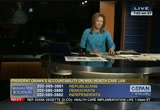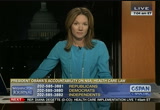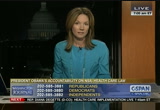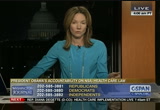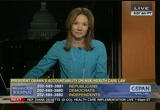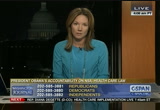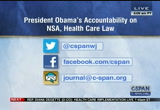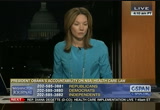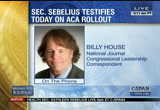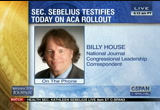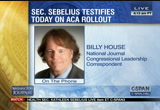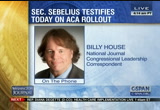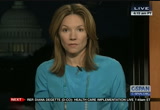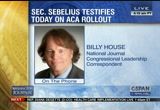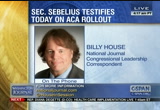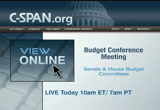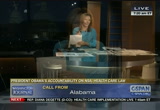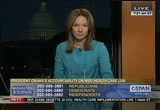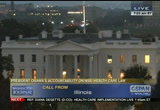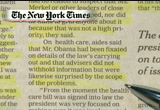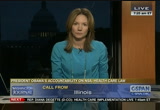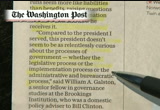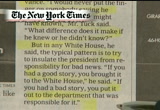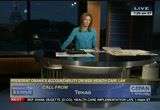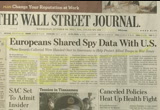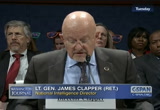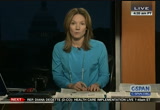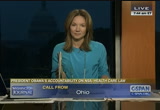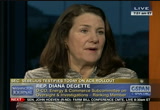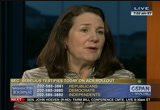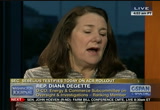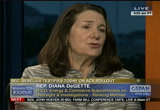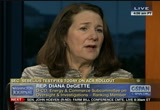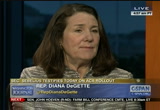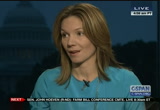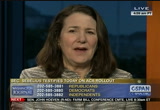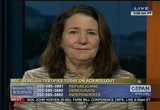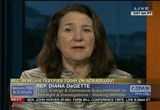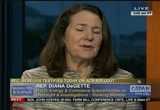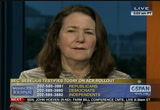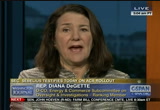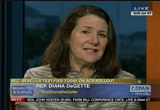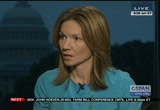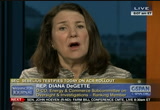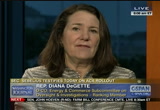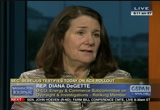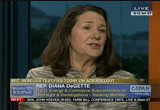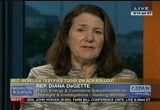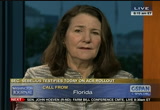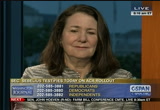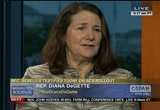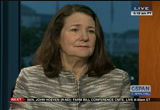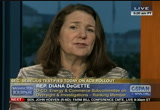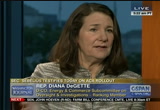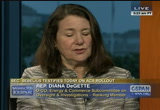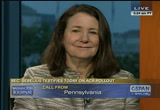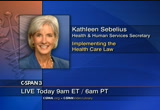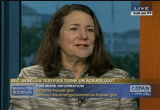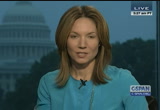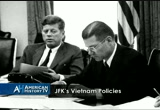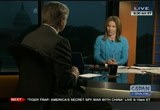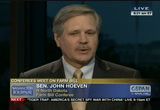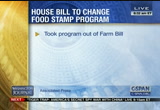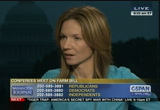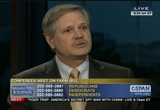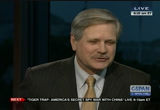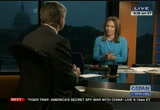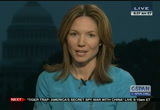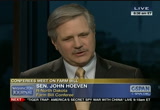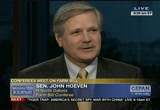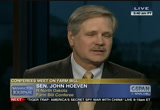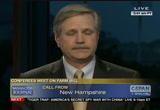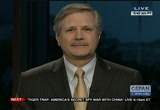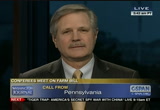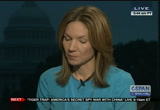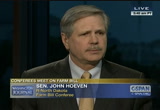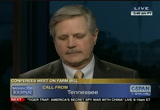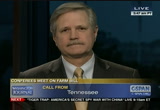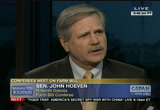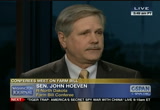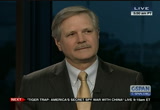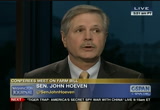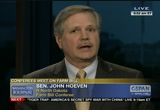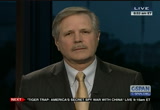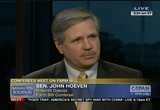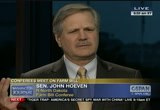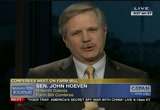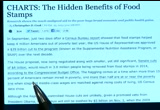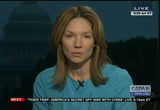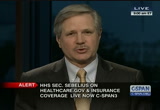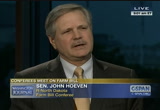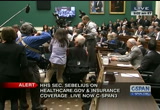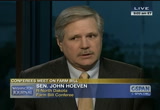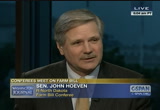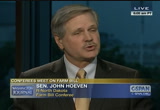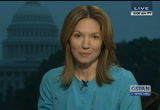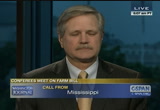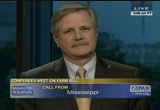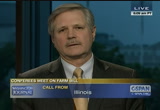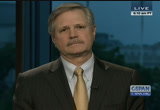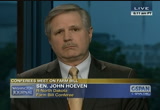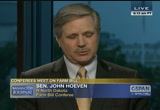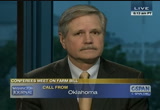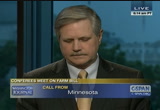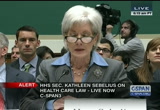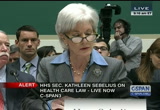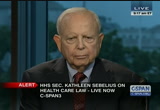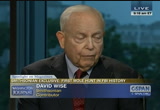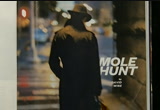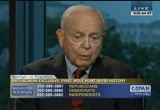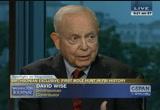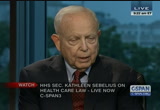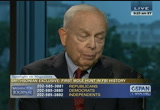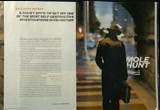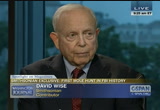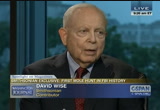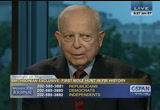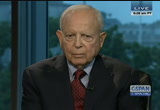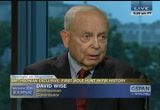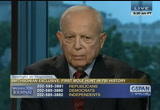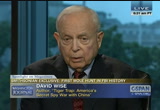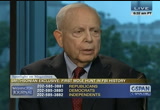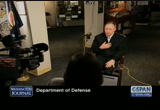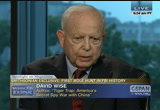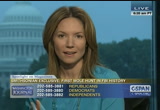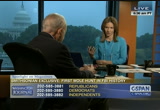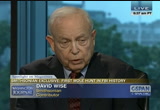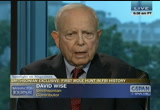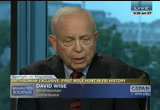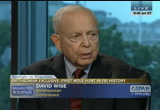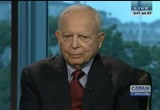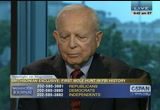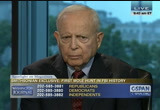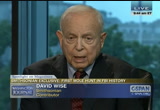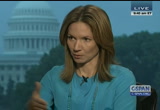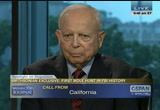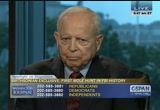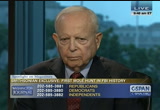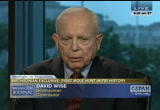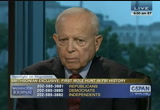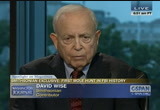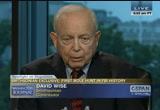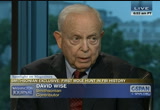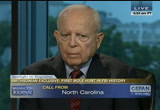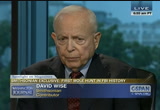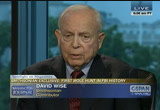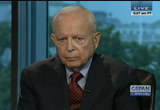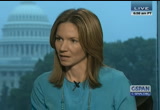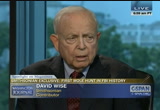tv Washington Journal CSPAN October 30, 2013 7:00am-10:01am EDT
7:00 am
david wise on his recent article , tiger trap. we will also take your phone calls come e-mails, and suites. -- and suites. tweets. >> good morning. all eyes up on capitol hill today with hhs secretary, -- kathleen sebelius and he hotseat over healthcare.gov. live coverage on c-span3 at 9:00 a.m. be toutingbama will the affordable care act in boston at the same place that mitt romney signed into law his health care initiative. that coverage also on c-span. sticking with the president today -- peter baker in the new
7:01 am
writes about the accountability on the nsa spying issue. here's peter baker's headline. post, bye washington scott wilson, controversies show how obama's inattention to detail may hurt his presidential legacy. we want to get your thoughts on this. republicans, (202) 585-3881. democrats, (202) 585-3880. independents, (202) 585-3882. tweet, @cspanwj. you can also post your comments on facebook or e-mail us. on both fronts on the nsa and the health care law, president
7:02 am
obama's! down to this -- i did not know. no president can be aware of everything going on in a sprawling government that he theoretically manage. -- theoretically manages. this constant questions about how much in charge he really is. days, the president's health and human services secretary said that the -- that despite internal concerns in a mr. obama wasn, not told about serious problems with the new row graham's website until it was rolled out this month. said theicials president was not aware that the national security agency was tapping the phone of agngela merkel. opposition lawmakers and pundits have seized on the white house
7:03 am
explanations to accuse mr. obama of being a bystander president. some democrats are scratching their heads at the seeming detachment from significant matter. msnbc ran a montage of clips showing mr. obama or his aides disclaiming presidential knowledge of various issues. what do you think? what do you think about the president's accountability on these issues and others. michigan, republican, dave am a what do you think? becausei am calling people like me are rarely represented in the media in the discussion about the affordable health care. you will find us in the gems -- , the health food stores, running, jogging, doing the tour there are millions
7:04 am
of us devoted to our health, narcissistic to a point. that is only because we are devoted to our health. -- he has. obama nerve to tell me how to stay healthy. i have catastrophic health care and that is all i need. i do not plan on getting all of these diseases that are acquired by not taking myself. commentt me ask you to on our topic. the accountability of the president -- i find that frightening. i feel a president should know details of everything. seems to be constantly saying i didn't know about it. here is a facebook message -- know everything?
7:05 am
ceos don't know everything in their corporations and they are smaller than what president obama has to deal with. this war against them is a distraction. i am tired of the gop. how can he know everything? caller: i think that is incorrect when they say ceos don't know everything about their business. if they don't know, they get fired. host: rick, independent caller, louisville ohio. caller: the banking industry -- they know exactly what is going on and they never got fired. is ahole obamacare smokescreen. this guy got elected and he got elected to change trade policy, to change the insane tax policy, to change the policy dealing with antitrust.
7:06 am
for the past five years, what you people have been able to do whichus on this obamacare has very little to do with the ,verall economy versus the wars the insane trade policies or insane tax policies. all of this is a smokescreen. it is almost like weapons of mass destruction. if you're going to say here and the 15,000 when you have 20,000 on unemployment. 100 million people are living in poverty -- this is all this is. this is just politics to of peoples issue being critical of the president? we are at the point of
7:07 am
this country where the whole thing is completely collapsed. after they at obama, had three years of borscht, the system needed the opposite. you people in the media created barack obama. and said of him coming in addressing the policies -- instead of him coming in addressing the policies, now you can talk about obamacare. i grew up in detroit. -- i wrotegreat book it. belt."g back the rust
7:08 am
host: i think we got your point. scott, texas, republican caller. caller: obama told us the fundamental change that he was going to bring to this country -- what he was talking about was socialism. he was not remotely all five for this job. none of his background qualified him for the presidency. he would not be qualified to sit on your school board or your local city council. he is a joke. point, do you think that is what has led to his explanations and this issue of accountability that we are reading about in the papers? caller: it is extreme narcissism. he is never going to be blamed
7:09 am
for anything. up to this point, the mainstream press has gone along with it because he was the one. all you have to do is look at his background and you know he was never remotely qualified. he is not even a patriot. he detests this country. is capitalist economics. on our facebook page posts this -- nothing is obama's fault. you last saw this behavior from little johnnie, i didn't do it. alyssa, democratic caller. caller: this is teresa. host: sorry about that. go ahead. the twoi agree with gentlemen that just spoke.
7:10 am
he is totally out of the loop. he is the president, he should man up. he should know what is going on in this country. of what is going on. it is always i do not know. he lames everybody else. it is always the republicans -- and now the democrats. host: did you vote for him? caller: i did not. him the first for time, the second time i did not vote for him because i did not feel he was all i. -- because i did not feel he was qualified. us -- i feelrming like we're living in russia. host: we are going to keep getting your thoughts on president obama's accountability when it comes to the nsa spying stories, the rollout of the affordable care act.
7:11 am
a bystander, scott wilson also writing about this in the washington post. keep dialing in. you temperature comments on our twitter page or on our facebook page. -- you can keep putting comments on our twitter page or on our facebook page. billy house is with us. let's begin with kathleen sebelius. she is up before the energy and commerce committee. would you expect your? we expect her to assure members of congress and the nation that the healthcare.gov website is improving and improving quickly. that is going to be hard to do because last night we learned the federal hauled -- federal hub crashed again for the second
7:12 am
time in three days. hoe.as a tough row to what about the news stories that came out yesterday -- nbc has stories showing the white house knew people were going to start losing their insurance coverage despite ,romises from the president dating back to 2009, that if you like your dr. you can keep them. think the president might speak to that a little bit today in boston. on administration's spin that is that it is the insurance companies who have overreacted or changed their plans so that more people are beaten -- are being given these notices then should be -- than should be.
7:13 am
wereknew that some people going to be dropped. they did not think it was going to be at this extent. host: where are democrats on their confidence levels with secretary sibelius and what they want to see from the president on the affordable care act? are nervous.f them some of them are very supportive. we saw that in the hearing yesterday. they want this fixed. they have been getting private briefings from groups like kaiser trying to assure them that this thing can be resolved. as we know, republicans are inzing on this, not so much and allowed way, but letting it play out and do the speaking for them. this is done more for their
7:14 am
benefit than 60 days of government shutdown. we are asking viewers to weigh in on president obama's accountability and the nsa spying. hett wilson has noted that did not know some of the details of these two issues. we have heard that before from the president. what are you hearing up on just fromll, not republicans, but from democrats as well? concern, almost a knee-jerk reaction that he did not know. concern about the -- he is at a fault, a very loyal guy. he is not the type of president who simply fires people, even if the political heat gets turned up.
7:15 am
there is concern that these issues are going to fester. we will see how that plays out. host: there's no indication from the white house that somebody's head is going to roll over the affordable care act or the nsa? guest: not yet. sibelius and her testimony will blame some of the computer companies that are running the site. marilyn tavener said -- apologize for the administration. the administration will go back and start blaming some of the computer companies they hired. host: you have the first formal meeting between house and senate budget negotiators. this conference committee put together by the most recent deal to open up the government and
7:16 am
raise the debt ceiling. what you expect out of today's meeting? cochairman of this ryanrence committee, paul has made it clear this is not going to be a grand bargain, so we should not pretend it will be. they go in as a budget conference committee with the democrats controlling me senate and the house controlled by republicans. last time they were able to reach an agreement was 1986. pi" was the popular show back then. we are not going to have a grand bargain. perhaps trading off of the real we soften some of these across-the-board cuts known as the sequester and offset them with some new
7:17 am
revenue. the devil is in the details of what revenue is. republicans don't want to raise taxes. todaythere are stories that the white house is open to not raising revenues and any deal they come up with and they are eyeing cuts to farm subsidies. ground.ld be "common " guest: that is correct. there's also the opening session of the long-awaited arm bill -- farm bill. this is the sort of thing that conference two committees can mesh their answers on and come up with
7:18 am
answers for both. viewersve the background on this legislation. why has it not passed? guest: this year was the first -it is ait was due - five-year authorization bill. it was due to years ago. a bill passed the senate last year. not put his did bill on the floor last year. he put a bill on the floor this to defeatt went down and only when he separated it empathy -- and removed the food stamp portion didn't pass. what we have now going into conference is one bill that cuts $4 billion in food stamps and $39her one that cuts billion in food stamps funding.
7:19 am
we have a huge gap of their. -- a huge gap there. house with national journal. we appreciate your time. we are going to have our cameras on capitol hill covering a lot of these events that billy house was just talking about. the hearing before energy and commerce committee with kathleen sebelius will be live on c-span3 at 9:00 a.m. eastern time. it will re-air again this evening at 8:00 p.m. on c-span. at budget conference begins 10:00 a.m. eastern time. we will have coverage on c- span.org. the farm bill negotiations begin this afternoon at around tooth p.m. eastern0
7:20 am
time. when president obama travels to boston later today, we will have coverage of that. all of this on our website, c- span.org. accountability's on the nsa and the health care law. peter baker and scott wilson writing in their respective papers about president obama saying i did not know on those two issues. teresa, democratic color, what do you think? let's go to tom. i think this is an overarching problem of leadership. in leadership, you should have a goal in your self to be held accountable for what happens
7:21 am
under your leadership. this is a problem of not getting the correct information -- it is aidsduty to remove the that are not doing their jobs. this is a problem of people not working together. host: a communication problem within the white house? caller: yes. host: what you do about that? caller: you have to figure out why he was not informed about these problems. he is a busy person and you ides that figure relevantthis is a topic that needs to be brought to his attention. someone should have the foresight to alert the president . leadership is about being able to see the consequences of your actions before everyone around you. tracy, mechanicsburg,
7:22 am
pennsylvania, republican caller. what do you think? caller: as a 65-year-old, obama will be held accountable. he alone shut down the government trying to cram obamacare down america's throat. who areike myself retiring, we do not want to. good ando make america that is why she is great. she is not great for any other reason except that she is good. she is not good because she is great. mess isthis whole insane. people -- it away has taken away people's rights
7:23 am
to buy health care the way they want to. jim, what do you think about the president and not knowing the details on the health care rollout and the nsa surveillance programs? caller: i think he has the wrong team around him. he should have been made aware of it. care, so manyth states have made auto insurance and in today's environment, one in seven people are driving without insurance. focus onhey going to people keeping their insurance or are they going to walk in and take one months worth of insurance and stopped paying on it? there are too many unanswered
7:24 am
questions. the bottom line as far as the white house -- everyone in there should be fired if he truly was not made aware of what was going on. host: on that point -- aides dismiss suggestions that obama did not pay attention on either of these areas. i said the president was deeply nations on the surveillance practices, but was focused on those areas that constituted the major threats to the united states. he had no reason to suspect that of merkel or other leaders close allies were being cap. on health care, aides said that mr. obama had been fixated on details of the laws carrying out and that advisers did not withhold information but were likewise surprised by the scope of the problem. , are you still there? what do you think? jober: if i did not do my
7:25 am
right, i would not still have a job. we are going to go to gym in chicago -- jim in chicago. barack obama is incompetent or a pathological liar. i cannot believe he did not know what was going on. what doesn't help is that the media continues to cover for this guy. they are making excuses for him. -- they made him, they liked him, and they're going to to -- going to continue protect them. if this were george bush, the media would have a field day. host: how is the media protecting the president? hardr: by not asking the questions. they always ask soft questions or questions that have nothing to do with current events in america today. host: tommy, republican caller.
7:26 am
what you think about our topic? caller: whenever president obama ran for election, he made all of the promises about the government. everyone is going to be held responsible. the good old boy system was going to stop and i don't see where he has accomplished anything. it seems like it is more deception and lies than there ever was. host: what you think the impact will be on his legacy? caller: truth be told, it is going to make -- of it. host: that is the premise of scott wilson's piece. he says president obama has yet to master the management of his administration. of information within his administration.
7:27 am
obama, who like many presidents had no executive experience before taking office has never pretended to care much about the details of governing. he prefers the big speech to congressional arm-twisting, the big reform to incremental change and the big foreign policy ambition to cultivating head of state relationships. it means that obama has appeared to be caught unaware as controversies envelop his administration. the west wing that he runs seems more like liabilities than benefits, raising questions about how much information obama wants and how he receives it. this president doesn't seem to be as relentlessly curious about the process of government. from peter baker -- peter baker
7:28 am
writes, those cases underscore the difficult choices in what to tell a president. aides determined that it would be inappropriate for the president to have advanced knowledge of the irs investigation. beresident should not involved in such investigations or law-enforcement cases because it could politicize them. john tuck said he was not bothered asnot as other republicans about mr. obama's not knowing about the problems with the health-care system in advance. i would never put the finger on somebody saying they should have known or might have known. what difference does it make if he knew or he didn't know? good story, you brought it to the white house. if you had a bad story, you put it out to the department that was responsible for it.
7:29 am
david, texas, democratic caller. what do you think? caller: this is all about president obama was legacy. these people -- president obama's legacy. these people don't care. they thought they were going to beat him, but they did not beat him. he won two times in the election. they are always talking about the american people. oldamerican people voted on -- on president obama. the number one job is to get this man out of here. they are not trying to help him. to tarnish or erase everything, even his name out about white house. rich, jacksonville, florida. -- how didm curious the affordable care act that
7:30 am
romney had changed to the obama bill. ? the tea party is doing a good job of destroying everything that man could put out there. that is what they ran on. that is what they are going to do. host: this is political for you? caller: it is very political. with ted cruz and his family heritage, they have strange parties. host: let me ask you about the president saying i did not know about the website or the nsa spying. does that raise concerns with you? from attentionr deficit disorder. i do not use a computer. i suffer from thyroid cancer. with this comes down the pike, i
7:31 am
am not going to be ever be treated for because i have a pre-existing problem. on the nsa issue, i want to show you headlines from the front pages of the newspapers. spying york times -- known at top levels. headlines are that the white house did know about the spine. the wall street journal follow- up says that in the testimony yesterday we heard keith europeanssay the shared spy data with the united states.
7:32 am
millions of phone records at the center of a firestorm in europe over spine by the national security agency or secretly supplied to the u.s. by european intelligence services, not the nsa. that is the headline in the washington post. nsa chief says the phone allegations are false. nato allies correct -- collected records and share them with the united states. the nsa director yesterday in that testimony saying that the allies were working with the nsa and some of that information was collected by the nsa itself. if you missed that, go to our
7:33 am
video library on c-span.org and you can watch it there. director of national intelligence, james clapper yesterday, talking about what they are trying to do to assure the american public that the intelligence community is making appropriate use of these spying tools. [video clip] .> we had an alarm go off over the past months, i have declassified a series of documents related to section 702 of the fisa. to inform thehat public. the public interest in these documents out ways the additional damage to national
7:34 am
security. these documents let our citizens see the seriousness, rigor with which the fisa court handles his responsibilities. however, in these documents, we have were had -- we have had to redact certain information, such as targets of surveillance. we will continue to declassify more documents. that is what the people want, it is with the president has asked us to do, and it is the only way we can assure our citizens that we are using the tools appropriately. james clapper testifying before the house intelligence committee. he was at the table before that alexanderwith keith who heads up the nsa. if you missed it, go to our website.
7:35 am
on the health care rollout, here -- white house races to quell health up for. they are seeking to improve communication with democratic lawmakers admits -- amidst the flawed rollout. senate democrats want the enrollment deadline extended. writes the opposing view for the "usa today, saying --end that open enrollment the opposing view for the "usa extend that open enrollment. period. gaithersburg, maryland. what are your thoughts on the accountability? caller: good morning.
7:36 am
where to begin? in the private sector you have everybody working together when you're talking about rollouts. your data points that you took from the press say everyone is talking about rollout. where is the pilot before you do the rollout? everybody works and has a piece of accountability for these types of things. at this as aok lesson. we can look at ways to do a involving the government side in the private sector side. just another example -- it is not a republican or democratic issue. it is a management issue. everybody needs to take accountability. that is all i have to say. catherine,, --
7:37 am
independent caller. go ahead, catherine. caller: you had a conference earlier and they were talking about holding the lady accountable because she did the website. they were saying people who already have insurance can keep their insurance and they do not have to change to obamacare because they have insurance. that was the goal of obamacare. if you have insurance, you do not have to change. because the saying prior insurance does not comply with obamacare, companies are canceling their insurance and they are not allowing anybody to keep their doctors. they are choosing doctors for
7:38 am
you. even if you really like the doctor, they are saying you cannot have that dr.. obamacare go back to which is choosing it for us. that is not the way obamacare is being told to everybody. it was supposed to benefit everyone. i think the whole united states has been misled on this thing. obama himself has let everybody down. host: in what way? caller: we were all misinformed on this obama care. insurance,not have this was supposed to be the opportunity for everyone to be able to get the insurance that they could afford. companies are having to cancel insurance because they do not comply to the new obama care. host: the white house, the
7:39 am
president have been misleading the american public. look at the headline here -- credibility under fire. obama'ss say that health pledge was too rosy in the white house insists they did not mislead the public about the law. although president obama never mentioned it specifically, his promise referred to people who uninterrupted health insurance coverage dating back inbefore the law's enactment 2010. the president's promises were , it was not a precise enough message. that is in the washington times this morning. jeremy, tampa, florida. caller: how are you doing? host: good morning.
7:40 am
caller: i was going to comment on his accountability. not think obama has any accountability. him get-- when i saw into office, i watched him. i have seen him. the things he is doing -- all of the people he put in his cabinets and his administration. i always considered him a liar and a thief. that is what i still believe. around the world, our enemies have been emboldened. us or think iran fears any of our enemies? look what he has done to our military. the distrust. i could go on. the irs. benghazi.
7:41 am
the fast and furious. he should have been impeached a long time ago. you: we will couldn't in taking your calls and the remaining minutes -- in the remaining minutes. today.negotiations begin the wall street journal headline is that the white house hints at flexibility on taxes -- may agree to a deal that does not increase taxes, does not bring in more revenue, but could include cuts to agriculture subsidies. onwill be watching that capitol hill today. those talks get underway at 10:00 a.m. eastern time. go to c-span.org for more details. the new york times this morning, business conservatives press for immigration action.
7:42 am
leaders from roughly 400 states .escended on capitol hill they are taking aim at house republicans they think support a broad immigration overhaul including some sort of legal status for the 11 million immigrants in this country illegally. are warning president obama before the iraqi leader's visit. an influential group of senators sent a strongly worded letter 'srning that mr. maliki mismanagement of iraq he politics contributed to the surge of violence there. carl levin says he has a lot of to pull hiso do country together. he has not done a good job of
7:43 am
it. is corker of tennessee quoted as saying what he has done is created a situation where the population is more excepting of what al qaeda is doing because of the lack of inclusiveness. herald -- front page encouraged to delay- flood premiums. it is introducing legislation to put off a heavy increase at an earlier law had put into motion. in the washington post, there is a picture of the diminishing support of the tea party. in "usa today, a look at the virginia governor's race at the amount of outside money that is
7:44 am
rolling into that race. out-of-state money dominates the race 72% of -- dominates the race. 72% of mcauliffe's campaign funds came from outside of virginia. this virginia governor's race is the only game in town. ohio, democratic caller. hi kathleen. caller: i am self-employed. i have gone without health care for 40 years. i have never taken a dime from the state for anything. i pay for my own health care issues. i have never had anything catastrophic happen. the firsting to be time that i am going to be able to afford health care. i feel that these glitches are unfortunate and in some way they
7:45 am
are it -- they are negligent. for someone like me, waiting another month for health care is not going to kill me. your previous caller brought up iran and made inaccurate statements. i wish you would bring -- have some program on the .onproliferation treaty dennis ross is pushing us closer iran.onfrontation with host: we appreciate the suggestion. if others have a suggestion, you @cspanwj.s, the wall street journal reports
7:46 am
the labor board has been confirmed. the vote underscores the over the labore relations board general counsel saying that the candidates and other officials open -- barack obama has appointed -- morning, the new chief of the fcc was also confirmed. ken, huntington beach, california. what you think about the president obama's accountability on health-care rollout and the nsa surveillance program? you,r: to be honest with there is a reality here that has
7:47 am
to be observed. if obama is guilty of anything, it is of being naïve. obama just kind of assumed that if you try to do some good things, some little guy in the thought the republican party would go along with it and in -- and would help if they thought it was a worthy project. the republican party has an agenda. it is to board money, to make -- rde money, to cripple the economy, and to make a major statement about how they're going to have things their way. host: spanish fork, utah. you are a republican, jolt. what did -- you are a republican
7:48 am
, joel. what do you think? caller: i think politicians get into office and try to do good and they find out what it really takes to keep the country safe. i think it is unfortunate that they do not feel like they can stand up and level with the american people. as far as health care goes, it is a massive overreach by the government. the government never does ll of that large of a program. host: we are going to be talking about the health care law and its role up with diana degette. we will talk with senator john hoven of north dakota about the foodbill over stamp program. we will be right back.
7:49 am
♪ >> welcome to montana state capitol. 1899uilding was built in and completed in 19 02. montana became a state in 1889. added two wings on either side of the building in 1912. in 1999, the building underwent a huge restoration project to replicate its grandeur from that 1902. this is what it would have looked like about 100 years ago. among the discoveries of gold last chance gulch
7:50 am
was one of the major discoveries. it is obvious that this was a town where there was a lot of money. they say there were more millionaires per capita than any other place. that has never been proven. as a -- it is a legend. it is a place where you can see the wealth that was poured into andcommunity in the 118880's 1890's. ♪ this weekend, exploring montana's state capitol. span2 andat noon on c-
7:51 am
sunday at 5:00 on c-span3. "washington journal" continues. >> we want to welcome diana degette. let me begin with what we were talking about with our viewers. the president's accountability on the nsa surveillance programs and the health care law as well. is -- is it an adequate answer for him to say i don't know? guest: he cannot be expected to know everything. he needs to know what the extent is. he needs to be engaged with his advisers. that, congress and the white house need to talk about what to do so that we balance the issues of national security
7:52 am
andthe issue of privacy relations with our european allies and allies around the world. this is the discussion we need to have. host: were you caught off guard when it came to the rollout of healthcare.gov? caller: i was a little. oncommittee had a hearing september 10. we had a number of discussions before that hearing with the contractors who were working on the website and at that hearing little over 10, a three weeks before the unveiling , the contractors came in and said unequivocally that the site would be ready on october 1. went down the line and they all said yes. , the site would be ready.
7:53 am
glitches on october 1, it took us by surprise. host: ahead of the testimony this morning from kathleen sebelius, her opening statement was released. blames contractors for obama care problems. that is what we are expected to hear from her when she gives her opening statement. are other headlines -- contractors described limited testing of insurance website. this was not tested before it was rolled out. who is responsible for that? the buck stops with the administration, but i will say this -- i am not interested in blaming somebody, i am interested in fixing this problem. in 2006 whenress we enacted medicare part d. whilember how it took a
7:54 am
to get that computer system up and going. i shake my head now because if you will remember how my we were to go senior citizens online and register for prescription jarden -- prescription drug coverage. website crash, but it eventually got going. seniors are very happy with the drug coverage they get. few bumps in the road and we get it going and we get it going fast, i think we will be pleased that people will be able to enroll. on for a long time, young people will get discouraged and will not enroll. host: do you think the administration should extend the open enrollment. period?pen enrollment guest: we have had insurance is will be these glitches
7:55 am
worked out by the end of november. if they are, i think people can enroll in time for the january 1 deadline. people can enroll in till march. quickly,f it is fixed we will not need to extend the enrollment. period. idea and ike the think this problem needs to be fixed. it needs to be fixed fast. assuming it can be fixed fast, i think we need to get folks enrolled. how many people have gone on to the national exchange states, there is interest in getting insurance this way. that is the purpose of the affordable care act. host: when the committee gavel then, we will have our cameras
7:56 am
there. people are able to watch on c- span3, would you think the environment will be like? isst: if the last hearing any indication, there will be a lot of questions, allegations being made against the administration or the contractors. not my concern is -- we did have the smoothest rollout that we could have. my concern is that we get this fixed as quickly as possible. i think it will be a concern. one thing that has been making me shake my head is the republicans who are angry that they are -- that there constituents -- that their constituents cannot enroll the way they want to. they are mad that nobody can get
7:57 am
on it. that is a dichotomy, i think. republicans are arguing that the affordable care act is dropping people their coverage. thatews reported on monday the obama administration has known for at least three years that millions of americans would get cancellation notices from their insurances. have you known this whole time? guest: i have not. some people who are buying insurance through individual markets, not most americans who are insured through their employers, that some of those folks who have been having to buy insurance on the individual market, all they have been able to get our policies with high deductibles and poor coverage. some of those plans do not meet the requirements of coverage of
7:58 am
the affordable care act. i did digging into this yesterday. these plans are not good plans result, mostd as a people that buy them do not keep them very long. they buy the plan, find out if they get sick it does not cover a thing, so they go to something else. ,nder the affordable care act these folks can go into the exchange, get the advantage of the competition of the exchange and they can buy policies that are better and have better call atge -- coverage and options equal or less of a price. did the white house or president obama mislead the public about if you like your dr. you can keep them? caller:
7:59 am
--host: let's turn to scott. how are you? a wonderful morning to both of you. my question is concerning credibility of congress and all of this. what credibility does congress have left to govern with when physics has already proven that building seven of the world trade center was brought down by explosives on 9/11 and the majority of congressmen are ignorant of this fact or can only offer rehearsed outrage in response to direct questions about this evidence? congress'hink credibility has suffered quite a bit in recent weeks. one thing that we can do about the issue you raise -- we can
8:00 am
work to gather -- we can work together to make the affordable care act work. allegations around the world trade center, to investigate those fully. people need to work together in a bipartisan way. host: next is a democratic caller. caller: i would like to say i am a senior. i have social security, and i have a provider, also. last year. -- last year, i got back money from my insurance company because they did not pay the 80% that they were supposed to be paying. i got $187 back a month. the other thing i would like to at 20 years young, old, and critically ill. if my husband's -- at the time -- company that he worked
8:01 am
for had not provided insurance for the employees, we would have been stuck with such a rent is bills. young people have to understand they are not infallible. and they needtoo, health insurance. they shall clamor to sign on for this. this is a good policy. the other thing i would like to say -- i watched "charlie rose" last night, and dick cheney was on there. shame on him. help thereh great from the american people, and putting down affordable health care just got me wrong. you areuth, what talking about, getting the rebate from your insurance as part of the affordable care act, were insurance companies have to spend at least 80% of what they take in in premiums on health care. if they don't, then they have to rebate that part of the premium to folks. millions of americans have gotten these rebates, and we think it is going to help keep
8:02 am
the cost of insurance down. on the issue that you raise about young people, we call them young invincible. they do not think they are going to get sick, but they do get sick or they get into an accident or something else. i would say, ruth, if you have kids or if you know young people, really encourage them to go in and enroll in the exchanges. for younger people, most states like my state of colorado have insurance policies where young people can go in and for a very low amount of money can coverage. host: robert lippert on twitter says -- trying to compared aca to the part d drug row graham, remember, part d was not mandatory. guest: well, irrespective of whether party was metaphoric or not, i suppose you could say was mandatory on the part of d wasre -- whether part
8:03 am
mandatory or not, i suppose you could say was mandatory on the part of medicare. i do not know of a senior that would refuse insurance coverage for their drugs. none the less, the comparison is that part d was a national computerized program that people had to go on to enroll. very similar to the health exchanges. that is the comparison that makes sense. from independent caller virginia. caller: i have a question. it just baffles me that -- ok, what is the thing about $2.6 trillion it is going to cost? 2.6 trillion dollars that it is costing to getting this thing going, and that is not a group -- that does not include everybody's insurance payments they are making every month. i mean, i grew up on a farm and we had hogs, and you would throw a bunch of feet in the trough, and the hogs would just come in. you guys, to be a budget people,
8:04 am
you should be ashamed of yourselves. you take so much freaking money to implement something, it is just outrageous. have you ever done the math? a $.6illion into to trillion -- into $2.6 trillion. if you can answer that, i would be really happy to hear it. yout: i do not know where are getting masochistic. let me give you this for consideration. the reason why we enacted the affordable care act is because there were millions of americans going without health insurance in this country, and if they a second, the only way that they could get health care is by going to the emergency room. all of us, the taxpayers, ended up paying for that by paying for indigent services and so on. our health care curve in this country was going up at a dramatic rate until it look like the projections were that health care would take up the vast
8:05 am
majority of our economy. the way to solve this is to get every american or as many as possible into some kind of health insurance program so when they get sick they can go see a doctor, they don't have to go to the emergency room. that was really the framework for the affordable care act. the congressional budget office has estimated that with the imitation of the affordable care act, we are going to bend of his curve and see savings. in fact, just in the three years since the affordable care act was passed, we are already seeing insurance and health care costs beginning to go down in this country. insurance premiums have gone down quite a bit, and if -- and as we heard from ruth earlier, many people are even getting rebates because their insurance rates are going down. the key to this is getting everybody enrolled, and then getting good health care coverage for everybody. host: we are learning this morning that the healthcare.gov website was down again last
8:06 am
night. what about the site not having the final security test runs? this person worried about identity theft saying -- doesn't that leave enrollees in danger of identity theft? guest: this is one of the questions we still need to answer to make sure that all of that security is there. now, to enroll in the exchange, individuals don't have to give a lot of personal information. they have to give the name, date of birth, etc., but that is one thing that we are continuing to monitor and to be worried about because we need to make sure that these sites have absolute security. host: mike rogers over the weekend was talking about the cyber threat of healthcare.gov. that it is not adequately beefed-up when it comes to security. have heard that allegation being made. i have not seen any evidence
8:07 am
that that is true. i've not seen any evidence that anybody has stolen anybody's information off of healthcare.gov. ,ost: another tweet from jean ohio -- isn't it true that insurance companies dictate what doctors you can use, not the government? get a different insurance company. guest: it really depends on -- right now when people buy private insurance, depending on what type of insurance they buy, they might buy an insurance plan that will only cover certain doctors. that has been true under the current system. under the different healthcare.gov and a different state exchanges, insurance plans that people will buy will be similar to the plans that employers are buying or people are buying through the individual market right now. many of those plans are preferred provider networks and other types of networks that do limit the doctors who take a plan. next call, camden, new
8:08 am
jersey, republican caller. caller: good morning. i'm calling with respect to the with the mandate and rollout -- the president cited as one of the reasons for the that there were somebody people interested in the affordable care act, but isn't it the fact that it with the law and you must enroll? so how do you differentiate between those who are genuinely interested as opposed to those who are trying to comply with the law? guest: i was talking to her lady in denver, colorado, which is where my congressional district is, and she was telling me -- she is 59 years old, she is a cancer survivor. she works in a beauty shop, and she has had to go on the individual market for many years to buy her insurance. it hundredthink
8:09 am
dollars a month in insurance, which is quite a bit of her income. pays $800 a month in insurance. the extentited when is "she think she can go online and save at least a couple hundred dollars a month. i think a lot of the people will work on and researching that were people who were in a very similar situation, either people who had really expensive who did not people have any at all. most people have insurance through their employers, and they will be keeping that. the tremendous demand we saw --ough these changes was these exchanges were people who do not have insurance but i was up right come in people went onto research appeared that is one reason why i've been urging the administration to our doubletime to get these exchanges working. it is wanting to get somebody
8:10 am
trying to get on and research plans, we have got to get them all planned up. times" has aw york piece tracking the affordable care act, and it talks about this issue of people getting cancellation notices that we have heard over the last couple of days that nbc investigated. he talks about the people who have insurance through their companies like you were saying. he said the story is different for the 10 million to 12 million who buy insurance on their own. rules for those policies have changed substantially for 2014. and this goes to the issue, and what you are saying that some will end up with better coverage. they may have to pay more, but they will get more out of their coverage. guest: let me say some of them made get better coverage, and may pay less because the way the individual markets have been working is -- like that lady i
8:11 am
mentioned who paid $800 a month in insurance -- is most people who work for employers, they are able to get a group plan, so get -- so they get a negotiated discount, but one person going into trying to buy insurance, especially if they have a pre- existing exist in -- i pray existing condition like cancer or diabetes, they were having to pay the very highest of interest rates because they were not able to negotiate as part of a group. many of these folks, these plans -- they had very high deductible plans, they were excluded, their previous condition was excluded. they were not getting the kind of services that they really needed, so many of those folks will be able to go on the exchange and get better insurance policies for less money. host: rocky wants to know this in an e-mail -- why was the federal government -- why does the federal government need to define the plan is right for me? how is it that you know what i need?
8:12 am
why do i need mental health coverage? why do i need to have drug rehab coverage, etc.? way insurance the works is that covers all of these conditions. you know, if you ask people, if you ask most people, do you need a plan that covers cancer treatment? notle would say no, i do have cancer. but unfortunately next year they might get cancer. it isy insurance works is literally insurance, it is like entering your home. and colorado, we had the and you buyoods in insurance. that is how insurance works. it is a conference of plan that will cover all unforeseen illnesses you might get. host: bobby -- bonnie is next, democratic caller. congresswoman degette,
8:13 am
thank you for explain how it works. the ignorance about this is mind-boggling. once upon a time before our health care delivery system was privatized, we were given health thatits by our employers were tied to our job, we were stuck in a job, and that is the way it has been. also, instead of getting pensions, the corporations when the points i did, we had to invest in 401(k)'s. for us ind out well 2007, dented it? -- didn't it? someone working for mcconnell who is getting less than the minimum wage, less than a -- working for mcdonald's was getting less than a living wage, we have to subsidize because we care about her people and would not let them starve or die on the street without. these --y that nothing.
8:14 am
they pay $50 a month, and if they go to a hospital, all they get is $50 and competition from the plan. i goes as far as a box of tissues and a band-aid. who picks up the expense? the people that are paying for their insurance because the premiums go up because it has to be covered by the hospital, and it affects everyone. these people just don't seem to understand that. but that is the way it works. guest: you are exactly right. if everybody in this country needs health care at some point, the question is -- how do you pay for that? by far the most cost-effective p.s., the best that is for employers help in america's helpless to give insurance of the doctors who goes to so not to go to the emergency room. the affordable care act -- not
8:15 am
only did he get this option of exchange is for people, but also expanded medicaid so that more of these lower income families like the one you talk about will be able to go into medicaid in most states. it also does a subsidy for a lot of the families that have been unable to afford to pay insurance premiums. i think that is one reason, by the way, that we have had so much interest in the exchanges. people really want to go in there and see what kind of insurance they can buy for their family and what i'm subsidy they will get from the government. are next, fort lauderdale, florida, independent caller. caller: a quick question, and after the representative answers, i would like to go further. representative degette, are you by any chance on the committee that is holding these hearings are now? guest: yes, i am. caller: i'm really glad to hear that because you have got your finger on the thing, and you seem to understand it so well. i hope you are able to get in there and really respond to some
8:16 am
parties'her criticisms and nonsensical ramblings. i am one of these people who received a cancellation notice. myo not regard it as cancellation notice came from obama or that it was the aca that canceled my insurance. it was because i had really lousy coverage, super high deductibles, but it was what i can afford. when i checked back with the insurance company and said what would the qualifying land have, it was super high cost. that was on them. it is not on the aca. went in pursuit through obamacare, whatever you want to call it, i think our exchange in florida is run by , and byss blue shield the time i came up with a plan, which i have not yet bought, but
8:17 am
i am leaning very heavily towards, i got so much better ,overage for so much less money it will turn out to be a blessing for me. have: i think we should you come up and testify in front of our committee because you are exactly the kind of consumer that i've been talking about, somebody who had no alternative but to have one of these very high cost lands with poor -- plans with poor coverage of inuvo into the exchange and get something that you can actually use. caller: hopefully you will continue the good fight. guest: two i. host: -- thank you. ert: is a fallacy that visits will be decreased as wait times to see medical doctors to radically increase. guest: i hope that is not correct because the very best way to get health care is to not going to emergency rooms. of the people i talk to, i met a
8:18 am
young mother in our district who has not had insurance, and every time her kids get in here at -- earache, she has to go to the emergency room. i guarantee you once she discovered, she will not be going and sitting for four hours in the emergency room. what this writer talks about is true -- we need to get more authors and more health care providers in this country in general. if you are going to but millions more people onto insurance, they are going to be using medical services. the one thing we try to do in the aca is give more money for graduate medical education to encourage more folks to it to medical school. host: our guest, congress woman diana degette, serves the first district of colorado, democrat . she is the top democrat on the oversight and investigations subcommittee. we will go to paul next in pittsburgh, republican caller. hi, paul. caller: good morning.
8:19 am
i would like to start thinking c-span for allowing us to have this unfiltered conversation that is important for the people to hear all of this. , ipent 30 years in the navy will be very brief. when the admiral was running an exercise, we would write the plan and then he would just call all the department heads in and go over all the details until he was completely satisfied that this was going to be executed properly. we call that leadership. it is an ingredient that apparently is missing in our government at the top level. it is inconceivable to me that you could after having the time that you had to roll this plan out to have this kind of a disaster, and everybody to deny knowledge. this is just amazing. with respect to the president's promise, and that is when he made, you can dismiss it if you like, but it was for explicit,
8:20 am
and it was as recent as 20 12 during the campaign, the president said "if you would like -- if you like your doctor, you can keep your doctor. period . if you like your health care plan, you can keep your health care plan. period. there was no and beauty. and that is just not true. you can call a misleading, or you do call it a likert you and colin misleading if you want to be generous. there are going to be people who are going to pay less by going to the market, but i would hope that you would conceive there will also be people who are going to pay more. guest: i suppose some people will get more -- will pay more to get a higher quality plan. there are a variety of plants in the state. when thing i do agree with this caller on is we really should have -- this site should have
8:21 am
been ready to go in a much more robust way than it was. i do not know why it wasn't. the contractors pointed the administration, the administration point that the contractors. i am done wasting my time trying to point fingers. what i'm focusing on right now is getting this site up and working so that's the millions of americans who show interest in buying plants can do that in a timely fashion. today" headline -- another mea culpa as officials testify over the health-care website. maryland tavener apologizing before that panel, brookover that -- we covered that here on c-span. her testimony, she was asked by many on the panel ok, how many people have signed up? and she could not disclose the number. do you know why that is? guest: the administration apparently has made a decision not to disclose the numbers of
8:22 am
people who have actually enrolled except for on a monthly basis. i do not know why they have made that determination, but they have told us that as well. host: do you think that is a mistake? again, i don't think it is so important to look hour by hour basis how many people have enrolled. what i'm concerned about is somebody people have gone on this site and been unable to get to the final part. i will say if you are buying anything, you are going to want to think about it. for example, i am going to be going onto the d.c. exchange, members of congress and their staff will be going onto the d.c. exchange, and so i have been shopping myself in the ec exchange with a different level -- in the d.c. exchange with the different levels of plants. just based on mike's parents, looking at all these plans -- just based on my experience,
8:23 am
looking in all these different plans, i am not sure which planet want to buy. i suspect this is going on with a lot of the folks around the country who were looking on the exchanges, trying to think about s andarious choices of plant how much they have to pay. i think what you will see an early december, you will see people selecting the plans and signing up. host: when you hear from hhs secretary kathleen civilians --- hhs secretary kathleen sebelius this morning, what would you like to know from her? guest: how we're going to make sure these exchanges are working in a robust way by the end of november as the administration has assured us. and what is the administration doing differently so that we do not have a repeat of the same problem we had on october 1? where we had the contractors coming in september 10, all the contractors were saying yes,
8:24 am
this is going to be ready, and then when the shops opened on october 1, they were not ready. i want to make sure we do not have a repeat of that same problem. int: let's hear from jerome pennsylvania, democratic caller. hi, jerome. we need you to go broke weight because we are running out of time here. caller: all right, i would like to thank the cable company for c-span, but i would also like to sameyou that i've had the automobile insurance policy for years, but i don't have the same car that i first assured with. -- insured with. i have made different changes to the policy over the years, and i still got the same policy. so why are these insurance companies and so reluctant just to add coverage that would be needed to these policies that they are canceling? host: thank you, jerome. guest: i think that is a good
8:25 am
question. one might think that the insurance companies would replace those policies with policies that did comply with the minimum requirements. arember, these requirements not goldplated requirements, they are minimum requirements under the affordable care act. like i said, i think that most of those people will be able to and get ae exchanges higher quality insurance policy that will get them more medical services for the same or less money. minutes, yout 30 will see the energy and commerce committee gavel in their session in there hearing with hhs secretary kathleen sebelius testifying before that panel. we will be there to cover that from beginning to end, live coverage on c-span3, 9:00 a.m. eastern time, and we will re-air this hearing at 8:00 p.m. this evening on c-span. let me hear from jackie in
8:26 am
jackson, louisiana, independent caller. go ahead, real fast. caller: thank you, greta. i want to ask you a question. your party in your president do not come to the american people and constitutionally go to all the states -- why did you not have the nerve or the guts to have a constitutional amendment that if we wanted a federal , if youon insurance just got three fourths of the states to agree with you, you would've had -- we want to do not want this, you won fair and square. how come you did not do that? we never had the money to do this. he was very much. i would like to hear your answer. guest: i am actually a lawyer by training. ism very glad that it difficult to amend the u.s. constitution. in colorado where i'm from, our constitution is about an inch thick because you can amend the constitution with a majority
8:27 am
vote. i think the u.s. constitution should be one of the most serious things that we do, and so did the founders. that is why they made it so difficult. fortunately, to pass laws like the affordable care act, you do not need to amend the constitution to do that. you simply need to pass a bill through both houses of congress and have it signed by the president. i will point out that president obama after we passed the affordable care act and he signed it into law, we then did have sort of a referendum. we had a presidential election. and he was elected with a vast majority of the votes. so now it is congress' job and the administration's job to implement the affordable care act, and that is what we are trying to do. host: converse woman, thank you for your time. guest: love it, greta, to thanks. host: coming up, we will speak with john hoeven on the farm bill.
8:28 am
later, we will talk with the smithsonian intervenor david weiss. first, news update with c-span radio. >> some international news this hour. police and china announce the rest of the of five people in connection with this week's suicide car crash in the heart of china's capital. they're calling it a planned terror attack. beijing's first in recent history. they identify the attackers as members of a muslim minority. police say the five suspects were detained the same afp monday attack at the firm -- the same day as the monday attack at the gate that sentiment square where party leaders live and work. back here in washington, war on the health-care rollout. cnn reports says the main website contractor cgi reported side issues before the launch on october 1. a company documents as there was not enough time in the schedule to conduct with a call adequate personal torments -- adequate
8:29 am
performance testing. there was at least one employee informed by an executive. in 45 minutes, hhs secretary kathleen sebelius testifies before the house energy and commerce committee. this is the second hearing this week on the affordable care act, and you can watch the hearing live on c-span3 or listen to it live here on c-span radio beginning at 9:00 a.m. eastern time. those are some of the latest headlines on c-span radio. in january 1960 three, the congress did something they had not done before. they stayed and they fought. americanlt, five copters were shut down, three americans were killed, kennedy was on the front pages of the "times" and he said what is going on here, i thought we were winning? beginning december, january into february, he will hear varying reports from white house
8:30 am
officials, state department officials, and military officials giving contradictory ever dance -- contradictory evidence about the state of the campaign in vietnam. 50thvember 22 marks the anniversary of president kennedy's assassination. sunday, a discussion about his oval office recordings and thoughts on vietnam. at 7:30 p.m. eastern, part of american history tv this weekend on c-span3. " continues.journal host: we're back with senator john hoeven, a republican of north dakota. he is also a negotiator for the farm bill. i am curious about given the inability of the two sides to come together on this piece of legislation over the past year or two years, how do you bridge the differences between the two bills? they are quite different. guest: that is a challenge bird as a member of the committee in the senate, we have been working to not only craft the best possible farm bill but also look
8:31 am
at what the house committee is doing to say we need to reconcile the two. what is the senate bill look like versus the house? guest: we focus on crop insurance and enhancing the crop insurance in the bill. that is what farmers across the country said is their number one priority. that is really our focus. we strengthen the crop insurance, make it work like he would for other business people. on the house side, they have continued to focus on the countercyclical program peer it over the health -- over the crop insurance. that is a different than the focus as far as the farm itself. food stampsbout which also falls under the purview of these two committees? guest: that is the biggest challenge we have -- reconciling be business and the food stamp program between the house and the senate version. everybody is focused on the numbers. reduce the cbo, congressional budget office,
8:32 am
scoring by $4 billion. they reduce it by $40 billion. everybody focuses on numerical differences. the reality though is we have to look at the underlying reforms to determine how we compromise on those, and use common sense. in other words, how do we form the program so we a laminate waste, fraud, and abuse so people who need help still getting? strengthens, we hope we bring people on an increase the right incentives to go off so people who do not need food stamps and that reduces the cost over time. [inaudible] host: according to the associated press, the house bill cuts $40 billion from the program. that is fighting percent from the program, and it allows state and recipients into the program out of their farm bill, passes epperly really. what does that mean for negotiations? they in essence brought about because they pass both now.
8:33 am
we're going to do with the traditional program and the farm bill, if you will, the farm site in the conference committee. we will be was both. we both need reforms from the standpoint of states not putting in a small match and then triggering the program, which we feel is an important reform to make sure everybody plays fair and straight. both the house and the senate has that included peer and we will come together on that i think easily. the challenges in the work requirement, how can we reconcile the differences between the house and the senate versions in a way where we create the right incentives by either finding a new job, getting training, going to school, doing community service, whatever, and then if you need assistance, providing that. host: $40 billion in the house bill, $4 billion in the senate bill, the tea party group heritage action fund, etc., says there are formulas the next fight. they have their eyes set on that in these negotiations -- says that the farm bill is their next
8:34 am
fight. where do you think the number settles at? is a below $40 billion? focusesverybody on the number. the way you get a, mice is hey, what are you trying to, sheer? -- to accomplish here? we want to encourage people to work so they become self- sufficient, but then we want to make sure people who need the help get it. what we really have to focus on is what is the underlying policy, what are the reforms, what are the work requirements? let's use common sense, come together, then that should drive the number, and i submit to you no matter what that cbo says up front, that is not going to be what it actually is over the next five years. the actual amount we save over the next five years will be a function of how we grow this economy and get people back to work. that is the reality. again, we cannot just get hung up on the number. let's create a good policy that works. host: staying on food stands,
8:35 am
here is brad plummer's piece from the "washington post." he knows the snap program costs about $80 billion a year, host: sever from your negotiations, there is a big cut separate from the stimulus bill, that would trump $5 billion from the federal program. with reports showing that there is an economic benefit to the food stamp program and the recession, or the recovery fragile, is it a good idea for these cuts to go through? guest: i think it is tough to call them cut 20 look at the growth in food stamps over the -- calle year period them cuts when you look at the growth in food stance over the
8:36 am
last five year period the number of recipients increased directly. you talk about a program that has grown tremendously, and we are making reforms, i think i'm a that really make sense, and the people should be trying to trainedind a job or be for a job or furthering their indication as part of getting the assistance i think makes sense. weterms of the program that are providing, again with the growth in the program, we certainly are reaching out and making sure the folks that need the help it. at the same time, across the country, people want to know that we are eliminating waste, fraud, and abuse and that we are creating the right incentives, incentives for people to go to work, get educated, become self- sufficient. host: the "wall street journal" has the headline, and the budget negotiation, separate from what you guys are doing, the house and senate conferees over there, along with the white house, are looking at on subsidies as a way to ease sequestration. they are writing those programs. do you know what rogue runs they are -- do you know what
8:37 am
programs they are areyeing? guest: i have long said the farm bill is part of the solution. first we craft the budget, and get to a debt ceiling solution the right way, we need to make changes in our mandatory spending programs. we need reforms, and we savings that are going to reduce the deficit and the debt. the farm bill is a great example. we are writing a better farm bill, and we're going to save another $30 billion, maybe more. that is exactly the kind of reforms we need to be making in a government programs across the board to find real savings to reduce the deficit and the debt, so they actually come together. i think that will help us get the farm bill done by the end of the year. host: let's go to phone calls third andrew is up for single and alan, it arkansas, independent caller. caller: it is glenallen, alaska.
8:38 am
oh, sorry, i do not read it right. caller: are you going to be completely doing away with it, because some of us in alaska really depend on it. both my wife and i are disabled. are you guys going to completely do away with it as time goes on? we are not.w, no, we continue the program, and i hope we make it stronger and better so the folks that help -- who need the help get a, to make sure there is not waste fraud or abuse in the program. people who need the program, you can become the bully will continue. [inaudible] -- you can be sure it will continue. host: farm bill is welfare for corporate farms. once working people to start. guest: that is not true. we have the highest quality lowest-cost food in the history of the world. every single american benefits from that, meeting every single
8:39 am
american benefits from good foreign policy. highest quality, lowest cost, for every single american and beyond. it supports 16 million jobs across this country, creates a favorable balance of trade. it is about fuel, food, and fiber. it is a very good deal for the american people. farmers dmany represents, how many corporate forms the represent in north dakota? guest: in a north dakota, we do not have corporate farming. host: so how many farmers? guest: probably 30,000. the last numbers i saw in our state were on board of 30,000. host: what have you heard from them about the impasse of the farm bill. we are working to get a yearterm farm bill, five farm bill. farmers and ranchers have to be able to plan for the future. you want to get the economy going, you want to create more jobs, you want to reduce the deficit and the debt with economic growth, get the economy
8:40 am
going, get a growing. one of the best ways to do that is to reduce uncertainty. you do that by creating a long- term farm bill. sector is very powerful. food, fuel, and energy. host: cleveland, mississippi, republican caller. caller: senator john -- guest: yes? caller: how do you keep from having so much broad? -- fraud? i know some at you as a full- time job and they just lie on their application to give food stamps. exactly one of the things we're working on in trying to reform the food stamp program so that somebody who should not be getting assistance does not get that. look, americans are very generous. they want people who need help to get the help, but they don't want people to abuse these programs. that is true whether it is the
8:41 am
food stamp program, whether it is medicare, medicaid, or anything else that we do. that is exactly what we are trying to do in the reforms that are made. host: pat in hooksett, new hampshire, democratic caller. caller: i have a question for you. i recently came up for renewal on my food stamps. now i am a disabled senior citizen. denied most of my food stamp benefits that i get. my income is $900 a month. i have always worked hard. i am on social security. and my food stamp benefit went from $86 a month, which is way something dollars a week, which helps me by nutritional foods. they have cut it down to $15 a month.
8:42 am
i am disabled. am i supposed to go get a job? and my abusing the system? -- am i abusing the system? i don't think so, sir. guest: i urge you to contact your representative or senator's from your state. i'm sure they can help you work goingsd and see what is on there. based on what you described come i do not understand why it would be produced. -- reduced. host: because if you are disabled -- guest: and unless you had substantial income. based on what pat described, i do not understand the production. she should certainly ask for help. host: gina, pennsylvania, independent caller. caller: hi. stamplling about the food program. the $40 billion in cuts that are being proposed, what length of time? is that over 5, 10 years, or is
8:43 am
that right away? itst: they actually score over 10 years. the farm bill is only a five- year bill, so it is actually $20 billion, and that is over five years. you are talking about $4 billion a year. remember, that is out of $80 billion. it is a small reduction. that is the house for bozo, and we will negotiate something am a but that puts it into perspective for you. also, i was thinking when you were talking about, i'm talking about mr. cantor's land, putting people back to work, basically a welfare to work program, i do not see a problem with putting people back to work better able bodied and can work. i just don't see a problem with that. i don't see a problem with those cuts over that length of time. i mean, some democrats say people are going to start. it is like, nobody is going to starve when you have cuts that
8:44 am
go over 10 years. you might see a reduction in your food stamps, but there are also charities, food pantries, and certainly families band together. nobody is going to starve. so, you know, that is all. thank you. guest: just to follow-up on that, remember the objective is to make sure people who need the help get it, but a decent time create the right incentives to encourage people to get work or to get trained or educated so that they can work. but there are exceptions built in their if you have dependents or if you are elderly or for reasons you cannot work or something like that. then there are exceptions to provide for that fear the effort is to make sure that those who need help get the help but create the right incentives to encourage people to be self- sufficient. host: there is a story on mother jones website this week, welfare reform is leaving more in deep poverty. a new report on the center and budget priorities look that cash benefits provided under the
8:45 am
temporary assistance for needy families, the tanf program, welfare has continued to decline steadily since the program was reformed in 1996. back then, benefits what exactly generous, but they did manage to get a whole of kids out of roll deep poverty. today, those benefits are was nonexistent. the you get a caller like last one was talking about what majority leader eric cantor wants to do, are you concerned that it could go too far? apest: understand tanf and sn -- host: two different things. guest: two different programs. remember, the welfare to work program or development within tanf was designed to try to help people, encourage people to get trained, get educated, get a job. that is what americans want. but the reforms at the same time are still designed to ensure that those folks who need help get the help.
8:46 am
that is exactly what we are trying to do in food stamps. i would have to go look, but i believe that if you look at the underlying numbers in tanf, the amount that is provided has continued to grow. ,here is discussion about certainly the obama administration wanted to eliminate some of those work requirements, but i really think the american people want to have a reasonable work requirement to create the right incentive, and to ensure the people who need help it. host: charles in nashville, tennessee, republican caller. hi, charles. is not exactly on subject, but my first, it is not exactly to do with what i called for. it is a response to a couple of comments. in my work, i see people 49 and older who are mentally ill, and they rely -- and also old, handicap, retired, and
8:47 am
they rely on their monthly income. what you have done with the sequester is put blinders on. it is not going to help. the blinders -- it is real simple. you're going to get this much, you regardless of where you are at. that being said, let's go to why i wanted to call. when you do the math, as far as the debt we are in and the money you are taking from the poor, specifically the poor and the retard, the old people, it really does not -- and the retired, the old people, it really does not add up. the way the stock market fell, they did not do that. when you look at the fraud and abuse, the government uses themselves to pad their own pockets. the poor did not do that. rather than take from the people that do not have a voice, how about look at yourselves? look at the people, look at the pockets that you are filling, and just ask yourself -- is it morally acceptable for you to take from the people that don't have it and continue giving to the ones that damn sure don't need it.
8:48 am
there are not jobs created. nafta killed all that. let's opportunity -- stop pretending. guest: i welcome the chance to respond to that. rather than making reductions across the board, we should be able to prioritize and do it anyway that really makes sense. that is exactly how we get to doing a budget so that we can prioritize rather than have across the board, and you can make good decisions about what are the priorities, where do we need to make sure that we are spending our dollars and where can we save or reform or reduce what we spent? that is the whole reason we work as hard to get a new farm bill where we make these reforms. second, any farm bill, 80% of the farm bill is nutrition. that means snap or food stamps. something like 83% actually goes
8:49 am
to help people who need the very help that the individual described. the third point is, as i said, it has grown substantially to help people, particularly in the economy to get the help they need, descend from the reforms we are talking about making provide the right incentive in terms of encouraging people to get trained or to go back to work. and if somebody cannot work, we sovide specific exception they can continue to give food stamp assistance. host: when you and your colleagues it done today for negotiations, what will you be talking about today? what will we see happen? guest: we will have our first meeting. the house and senate conferees will get together for the first go throughd really our opening positions in terms of what we really want to prioritize in the farm bill, and the final product, and then we will work from there to come together, get a combo mic that
8:50 am
we can take back to the house and the senate floor for final votes. i really do think it is going to be a part of a year in the budget because we provide real reforms in real savings. host: when you say that, do you think it will be incorporate it into whatever the budget conferees are doing? the budgetou watch conferees, they will already start talking about the savings that we are going to provide in our conference with the new farm bill. host: our viewers will be able to watch both. we are covering the budget conferees this morning at 10:00 a.m., and we are covering the farm bill, reason this afternoon at 2:30 p.m. both are viewable on our website, www.c-span.org. go there to find out when they might air as well on our network. give our viewers the background on the contrary is coming together today for the first time. what has been the hold up? guest: i am pleased we are coming together. i have really been working to get this done. we passed a strong bill in the
8:51 am
senate. the house, as you indicated earlier, actually passed their bill in two steps. they passed the farm bill with the various farm programs, conservation programs, and then they pass the separate food stamps bill. now we have got both of them in committee. it took them a little bit longer , and then they had to name their conferees, which they just did a week before last. now we are coming together for the first hundred i think the pushes onto really get this done before year end, and i think it does dovetail with what we have been talking about, and that is the work the budget committee is doing as well. this is something i've been pushing pretty hard for the last two years, to get us into conference, to get the two versions reconciled between the house and senate and get this long-term farm bill done. right now, we are operating on a one-year extension. we need a long-term deal in place. host: nick is up next, columbia, maryland. caller: good morning.
8:52 am
our farmhe cuts in bill are being approached the runway. we could have looked before cutting out any money out how we could be more efficient at it. anytime you see somebody in the grocery or food stands using them to buy fritos and junk when they could be biting let us and things that were healthier for lettuce anding things that are healthier for them. guest: i certainly understand appeared we are trying to write a program that does provide the right incentives. i think you are talking about some of the things we're trying to do in a sensible way. host: in these reforms, there could be policy changes as to what you could buy with the food stamps? guest: we really have focused more on the fundamental requirements in terms of work and education and abuse as far as some of the state programs. all of those things go into getting the most commonsense programs the right incentives. host: we go to peter nexen
8:53 am
nebraska -- next in nebraska, independent caller. caller: i'm calling about the working class people that the politicians and the corporations, since before ronald reagan, were wiping out the unions just as fast as they could to keep the wages down. then ronald reagan came up with amnesty, and then clinton came up with sending the factories up overseas, and now mr. obama wants to bring in the immigration reform and spend more money. every year, we probably spend more money on the people that are here illegally then we do on obamacare. they keep talking about reforming social security, and only need to do, the way my politicians tell me, like ben nelson, was take the cap off social security and that will
8:54 am
take care of it. , guess that would take care of you know, the wealthy people during the mr. bush administration, got all of those billions of dollars, you know -- host: senator hoeven. guest: he covered a lot of ground there. i'm not sure where to start other than we are in a situation now where we do have to reform our mandatory spending programs. that comprises two thirds of our budget. we have a deficit and we have a $17 trillion debt. or undertakeo find reforms that generate real savings so that we not only reject and preserve programs like social security and medicare, but that at the same time you get a grip on our deficit and our debt so that those programs are there for future generations.
8:55 am
and we also have to get the economy growing. that is why we need these reforms and we need to get them in place, create certainty, get that economy going, and then the thatnation of the savings we generate an economic growth is what addresses the deficit and the debt. i believe we can do in a way that people benefit because we create the right incentives in these programs. we talked about a lot of different things, but that is what we are working to do, that is what we should be working to do on behalf of the american people. host: explain one farm bill program, so my call of a subsidy, that you like, that you don't think should be touch or changed, and name one that you think should be overhauled. enhanceor several, we crop insurance. that just makes sense. every business person out there insurers his or her bruises in -- his or her business enterprise. host: with taxpayer dollars? guest: understand that in the
8:56 am
farm bill you pay a premium, ok. there is some help in some support there, but they all have to pay a premium just as other businesses what or do. and we are reforming the program so formerly when farmers or ranchers got any kind of direct payment, we are eliminating all those. reducing orlly eliminating any direct subsidies in terms of the farm program. that is the kind of reform we are undertaking to make this, i think, a more cost effective program, and as i say, saving on the $30 billion for the taxpayers. back to my earlier point, every single american benefits from the lowest cost foods broad -- food supply in the world. host: any farm program that is getting overhauled or completely eliminated? guest: we are completely eliminating direct payments. that is one that people have talked about for years. we completely get rid of it. there are others as well.
8:57 am
host: gary, lady lake, florida, republican caller. caller: hello, senator. my name is jerry. yourld like to add that representative in western north dakota is absolutely awesome. what a great, helpful person. sir, my question is -- how to partisan politics play in voting in the farm bill? if 83% is focused on food stamp programs, how can anybody vote against it? and how do you see partisan politics playing in voting in the farm bill? guest: thank you for calling in. historically, the farm bill has not been a partisan politics. it has been a little bit more in terms of -- the division has been a little bit more urban, rural if he will because people come from more rural states like i do really understand ag. the caller makes a good point.
8:58 am
80% of the program is nutrition. school lunches. food stamps, as we have been talking about, which are importbly beneficial and into urban areas. if people understand how the farm bill works and understand the value that the farmers and ranchers bring, again, i think that is why we will be successful and why we have been able to get support for the farm bill feared historically, it has not broken down in terms of republican and democrat. it has been a little more rural/urban. host: let me go back to the food bill viewers, the house cuts by $40 billion, the senate by $4 billion. mother jones also on their website has this -- the house proposal now being negotiated along with smaller yet still significant senate cuts of $4 billion would result in $3.8 million -- in 3.8 million people food stamp infrom 2014 according to the congressional budget office. do you agree with that number? guest: no.
8:59 am
let's put this in perspective -- you are talking about $40 billion, which is the congressional budget over 10 years. the actual formulas five years. now you are talking $20 billion. you divide that by the five years, you are talking $4 billion a year. out of $80 billion a year in food stamps. it is a very small reduction. we are so going to end up with a compromise between the house number and the senate number. i certainly do not agree with their number, and as i said earlier, i think we are really reforming the program in a way that encourages work and encourages education but make sure the people that need help get it. host: we will be talking, by the way, tomorrow with mother jones reporters and writers here in washington. we will be light from their d.c. bureau. from theirbe live d.c. bureau. we will be talking about news of the day. tomorrow on the "washington journal," mother jones magazine. let's go to ruon next for
9:00 am
senator john hoeven. caller: it is nice to speak with you. i had a question regarding the payments, insurance the percentage that goes to insurance companies that operate under this farm bill. there was a plan put forth by a democrat to reduce the guarantee and use that savings to put forward toward some of the reduction that would take place in the food stamp program. could you speak to that issue? guest: that has been reduced significantly. i think something like $6 billion just over recent years. that has been reduced tremendously. there are some specific things federal crop insurance, such as weather and things like that that are different than other insurance products, but what you are talking about has taken place, and there have been significant
9:01 am
reductions in the assistance and companies get to underwrite farm insurance. host: here is a tweet from the viewer -- the value of the farm and four3.95 of milk dollars a gallon of gas. i think what they are trying to say is that there is a value to the farm bill in keeping prices lower for milk and for gas. guest: no question about it. look at the ag industry. we have hundreds of thousands, millions of farmers across his country, farmers and ranchers, that compete to provide all of these food products, and they provide an array and a quality level of food that is historic in the world. how would you like to have a few big corporations doing all the farming in this country.
9:02 am
come --host: we will come back to this conversation. kathleen sebelius has entered the room on the house side for testimony before the house. for our viewers interested in watching this, we will have live herrage and we will re-air testimony this evening at 8:00 p.m. the amount of people in that room for testimony is significant. a lot of photographers, a lot of cameras. if you are sitting there today, what would you ask her? guest: i would ask her what happened with the website. did you know it was not going to work? so, why did you not say something so we could delay it? if you did not know, why didn't
9:03 am
you know? that is step one when it comes to obamacare. if you cannot deliver a website and tell people what is going on, how are you going to deliver this health care approach. i think this is the wrong approach. i think we should get an approach where we empower people to choose their own insurance and health care provider. not takeue does responsibility, should she be held accountable? should she resign? guest: she should be held accountable. whether she stays or not, that is president obama's choice to make. look at the impact that obama care has on the people of this great country. it affects everyone. we all have health care. it affects what health care we get and how we get it. it affects all of this -- all of
9:04 am
us. host: the enrollment. period, the deadline is january. peopleannot get on now, will be able to get rolled if they get these problems fixed. guest: will they? they have a real problem. is saying that you have to get enrolled in an insurance policy. you have to -- you cannot go on the website and get it. look at how many people are being canceled under their existing policies. that is a real problem. will get itot they straightened out -- we will see. she is going to answer those questions today. she absolutely needs to be held accountable. we elect people to be accountable for the policies they put forward for the american people.
9:05 am
host: let me read "the washington post" -- under the new health law, many dropped by insurance companies will be better off in the end. they will get more. they will be less financially vulnerable when they get sick. in some cases, dramatically less. new plans will also put taxpayers at less risk of having to cover big medical bills when underinsured patients all ill. that goes for people who currently declined to buy insurance but will have to next year. guest: who gets to decide? who gets to make that decision? the federal government or you as an infant -- as an individual? if you get canceled off of your policy, a policy you pick and you have to go to the exchange and get a different policy -- federal government, secretary
9:06 am
sebelius, president obama, they say you are better off. they get to decide that or do you get to decide that as an individual? tot is the point i am trying make. people want to make their own decisions about health care insurance and providers. to have everyone else come in and say we can decide, uncle sam can decide better than you as an individual. i do not agree with that. a 65-year-old man. does he need maternity care? is going to pay more for it. i do not think so. it comes down to a fundamental belief on whether you believe individuals or the federal government can decide on health care. made,those points will be happening right now on c-span3. secretaryby hhs kathleen sebelius.
9:07 am
they're going to begin with opening statements and the secretary will get hers. you can expect a q&a that will last a while. we will re-air the testimony at 8:00 p.m. eastern time on c- span. back to our conversation with the senator about the farm bill negotiation. republican caller, go ahead. greta andod morning, senator hoven. -- senator hoeven. the farm bill policy is wrong. it was transferred to the federal government to make farm policy, we had a great depression 70 or 80 years ago. have -- it is all linked to lack of farm income. together with this one size fits all.
9:08 am
obamacare and everything, the federal government is going to tell you what to do and how to farm. subsidizing an overproduction is driving the small farms out of business. it is going to drive the doctors out of health care. you, senatoro hoeven, when are we going to quit subsidizing the market place and we're going to start guarding the marketplace. ? all their supposed be doing in washington dc is regulating the marketplace. -- all they are supposed to be doing and washington, d.c. is regulating the marketplace. think clyde makes a
9:09 am
good point. we are trying to do what he is talking about. we eliminate direct payments under the farm program. we try to shift over and create a stronger insurance program so that farmers and ranchers can purchase insurance that works, similar to what other businesses do. we are trying to do what he said. we're trying to get to a more market-based approach. glenview, illinois, democratic caller. have two questions, one is about the farm bill. let me ask one thing first that you brought up with the health plan. how is theking about government going to be able to handle the exchanges, etc. i asked the readers to look this all the seniors on a
9:10 am
, give themr system vouchers and they would go to exchanges, just like this, to sign up for private health insurance, one at a time. that is 50 million people. it would be virtually identical to this. please, go look it up. how can you vote for something when brian wants 50 million seniors to sign up through exchanges? guest: that's a good question. caller: you brought up the , thele of insurance moderator pointed out how they do not get tax subsidies for that. you pointed out that they have to pay premiums. it is still subsidized premiums.
9:11 am
a lot of the public is tired of industries. they want it stopped. guest: in terms of the health care, there is a difference between offering an option and requiring that everyone has to go to an exchange. it is the difference between offering people choices and options and setting up a around that everyone has to abide by. obamacare -- you have government run health care lands that everyone has to follow. that is one of the biggest difference is there. in regards to your second question, that is why we are reducing the subsidies under the farm program and trying to make it more like other programs. in manufacturing, there are tax incentives that manufacturers get. those are things designed to create incentives, encourage
9:12 am
economic growth and job creation. that is the approach we are moving towards in the farm bill. host: sheila, oklahoma, independent caller. caller: i had a comment on the food stamp program. than going to get worse what it is? as of november 1, i have a family of four and our income is a month and we are being cut to $195 a month. get any worse or is it going to get better? we try to make sure that if you have dependents and you need help, you get the help. the program.dea of for folks that may be disabled and cannot work or someone that has dependents and needs help, we are trying to make sure that that program is there for them. i think you will see that that
9:13 am
is the case. ofactually deliver that kind program. if you look at food stamps and what this country provides in nutrition support, it is growing, not going down. host: sheila, are you still there? caller: i was working full time and my husband was on unemployment. we got over $2000 a month on and food in income stamps and like $500. now that i a need it -- now that i need it, i am being cut down to less than $200 per month. , ithe time i pay my bills might have 50 bucks left for the whole month. we are on disability, me and my husband. it is hard to come up with that extra money to go with feeding two growing kids.
9:14 am
it is crazy. guest: the support for food stamps is there and will continue. you may qualify for other types of assistance depending on your circumstances. in terms of food stamps, the food stamp assistance will continue. call, john,st minnesota, republican caller. caller: with the technology that we have for scanning at grocery stores, has there been discussions for the sake of nutrition and savings -- using that technology to weed out certain products from running through the chills in this program -- through the tills in this program? guard i am one to
9:15 am
individual rights and privacy, so i am careful about that thing -- that kind of thing. it is a public program, so we have to make sure that there is a reasonable, commonsense rule. that is something that we have to work on and are working on in terms of the food stamp program. will benator hoeven gathering with his other conferees to hash out their differences on this farm bill. we will have coverage on c- span.org. senator, thanks for your time. guest: good to be with you. host: let me remind our viewers --kathleen sebelius is giving her opening statement. the system has been strengthened with double the size of servers, software that is better optimized, and a high-
9:16 am
capacity physical database. referred to outages this weekend and again yesterday. if you readest that it isatement of verizon, the verizon server that failed, not healthcare.gov. it affected other customers. we have a lot of work to do. you a plan in place to address key, outstanding issues. it includes fixing bugs in the userand refreshing experience so folks can navigate the site without encountering error messages, timeouts, and slow response time. consumers are using the site, every day. they continued to do so. problems are being solved.
9:17 am
we know that we do not have a fully functioning system that consumers need and deserve. of ae at the beginning six-month open enrollment which extends through the end of march. there is plenty of time to sign up. the average open enrollment for 2 to 4urance plan is weeks. kathleen sebelius giving her opening statement but swain -- before the committee. our coverage continues on c- span3 and we will re-air the coverage this evening at 8:00 p.m. eastern time . --are going to switch topics david wise is sitting with me. he has written several books about intelligence gathering.
9:18 am
you have a story in the recent addition-- the recent "smithsonian" magazine. "when the fbi spent decades hunting for a soviet spy on its staff." when did this happen, how did it come about? guest: it is the first mulholland. hunt.e i broke that story. the fbi still will not talk about it. a kgb agent in new york city walked into the fbi building in manhattan and volunteered his services. he said he was discontent and
9:19 am
his talents were not being recognized. said were toe taking a big chance to walk into our building because you might have been seen? no, i am not worried about it. our people are meeting with your guy, dick. that was telling the fbi that the russians had a mole inside the fbi and the russians called him dick. hunt tolaunched a mole try to find dick. because they did not know his real name, they called him an , which stands for unknown subject. upside downe fbi
9:20 am
for a couple of decades. they are looking for this guy. host: the year that it all began? guest: 1962. was he ever caught? he or she? that's an interesting story. it was a he, as far as is known. was code-named fedora. as to whether or not he was telling the truth or trying to -- the belief was there was a mole. there were about 500 people in the new york office they were looking at. of them could have been the mole.
9:21 am
9:22 am
to see ifan looking they could find anyone who had retired whose name began with that letter. when you translate something into surrealistic, the russian -- cyrillic, the rationale for russian alphabet and then retranslated, he found a match for somebody who had lived in queens and had been eased out because of a drinking problem. it was believed he was the one. he denied it. he was visited several times by fbi agents and he denied it. one of these agents believed that denial and one did not. there were other interesting aspects in this because a man
9:23 am
lougankahlúa get in -- ca wrote that he had sent some of his people to visit this man in they hoped to get more information from him. he tells to calougan, me the man said he gave everything he knew, don't bother me anymore. host: is he still alive? sub, dick? guest: i do not know. what do they say about your mole on? even though i quote these
9:24 am
people on the record, the fbi's official comment is we have no comment and we will not confirm there such a case. host: nor deny it? guest: they will not comment on it. you have been covering these agencies for years. what you make of their response? guest: they are sensitive about the fact that they were in a traded for the first time, or so they believe. attentionant to focus on it. it was more of a pr comment because you have these guys telling me about the case which is in the story. host: david wise, contributed to "smithsonian"t magazine. that is our spotlight this morning as we continue our series on the "washington journal."
9:25 am
"the inside story" and co-author -- before we get to phone calls, we encourage our viewers to start dialing in now. talk about what happened when the fbi learned of a mole giving secrets to the russians at the time. what does it trigger? it triggered a mole hunt. colaug. came in and volunteered his services, one thing was certain and that was he was not talking to the mole. they were reassured about that.
9:26 am
fbi launched an intensive mulholland that went on for decades. two people were put in charge of it. they were senior people who were very trusted and new that they were not the mole. they began looking at the background of all of their people. one story that i love is that -- she named jim nolan was a young agent in new york looking for a place to live. a young agent in new york looking for a place to live. he goes down to the garage with another agent -- it was probably tapped. guest: you just killed my story.
9:27 am
pick up any agent within says do not use this one. that one is tapped. he was thinking if that law must tapped, all of the other phones were tapped. host: that is what triggered the mole hunt for several decades? guest: it was the russian walking in and saying, you have a problem. host: let's go to charles, tampa, florida, republican caller. there was a book written and sold in bookstores about and i.t.nssen, specialists. i wrote that book. it is called "spy." this mole and story
9:28 am
today is about the same man? guest: it was about the first -- molend -- moral hunt hunt in the fbi. after that, there were at least three. there was a man named richard miller and a man named earl pitts. then there was robert hanssen, who was sentenced to life in prison. the ferry -- i was writing about the very first mole, a man named dick. caller: was their concern about the first mole that she wrote about? does this indicate there may be other people having secrets to other agencies in the --
9:29 am
outside of the fbi. they always have to suspect there might be some sort of internal problem. there is always a continuing concern. not so much anymore about the first mulholland because that was so many years ago. it is a continuing concern. both agencies have important calendar -- counterintelligence functions. host: could happen today? happen today.d the russians still have a spy agency. -- svr.lled the s vr they just change the initials from kgb to svr. they do some spying, but they are more internal.
9:30 am
they have a setup like we do. they have an inexorable service like the cia and an internal fsb.ce called the connecticut, democratic caller. byler: there is a book "enemies:ener called a history of the fbi." and discussed the moles 9/11, theding up to fbi was criminally negligent because of things that occurred in 2001. that is not what i wanted to talk about. i want to talk about the fact
9:31 am
that the nsa surveillance has been going on further than the bush era. it is been going back to j edgar onver when they eavesdrop and theyther king, jr. blackmailed him. i was wondering if you could speak on that. thank you. what youro not know question is, exactly, but the nsa, which did not exist until has gone beyond what anyone realized. it's hard to believe a terrorist would call her up and say i am a terrorist, i thought you would -- i thought i would let you
9:32 am
know that we are going to blow up a building. host: we make of the revelations overall of the work that the nsa what do you make of the revelations overall of what the work that the nsa is doing? important nsa is an agency. it seems they have gone beyond what anyone suspected they could be doing. i do not think their collection is not over her, but logged. that seems to be going beyond what is necessary. if they have a bad guy, they can put in for a warrant. they will get a warrant in almost every case to wiretap that person. that i not need to know
9:33 am
was talking to my brother or my aunt on the phone. -- if they suspect you or they suspect me, they can get a warrant and they can wiretap her phone. they do not need to wiretap every phone in the world. it is mind-boggling to think about the amount of data that is. several comments were made by keith alexander and he made the case that what they do helps agencies like the fbi. i want to show you and get your response. [video clip] >> we are only part of the intelligence agency that does that. the fbi is a tremendous partner in the homeland. they do great work. our job is to give them the
9:34 am
information we see coming from overseas into the united states. tremendous foreign intelligence capability to see things that are going on in the united states and help people understand what that means. the fbi is pretty busy. they have a lot of stuff going on. if you see something critical, thatn tell he -- tell them piece of information is critical, go after that first. as i said, the idea that they're going to help the fbi by logging every phone call made by , which they did , i do as far as i know not see how that is helping the fbi. it is almost as though the nsa is saying we're art -- we are doing this because we can. host: brookfield, connecticut,
9:35 am
independent caller. hi phil. caller: one of my favorite books was i chose freedom. i was wondering if you had ever run into the author or knew of his work? book, i've heard of the but i have not met the gentleman. host: phil, do you have a follow-up? no, it was just a fascinating tale of living in the united states, being pursued by the kgb. host: what about the history here between russia and the united states and spying on each other? why are you interested in it and what do you make from this report and the smithsonian magazine? i love it. the professionat
9:36 am
is never going to go away. it's interesting mean i am a of the mediaaivety . it is still being denied. guest: the media does not pretend it never happened. witness my story in the current "smithsonian." host: we will move on. if you could speak a little bit about the history. begins inmole hunt 1962. what is happening at this time in our history between russia and the united states question mark -- russia and the united states? it of russia is spying on the united states and
9:37 am
vice versa? foughtthe cold war was largely by intelligence agencies. war --s presumably the that was principally the war between the cia --. they are not located in the famous square in downtown moscow. they are located on the ring road. i was the first western reporter allowed in. i spent an evening interviewing a general there. it was interesting. i asked him about the future of the soviet union and russia, it was just before the collapse of the soviet union. he predicted a lot of trouble -- the the rub public's
9:38 am
republics in the south. the war in chechnya came afterwards. he spoke perfect english although he had never lived in this country or an english- speaking country. that was impressive. the war between the agencies washington, moscow, it was difficult for the american cia people in moscow to meet people. the russian kgb people were effective in surveilling the embassy were most of them were stationed. if a cia person stepped foot outside the embassy, six kgb guys or following them. burstmes they used -- very fast transmitters. other cases, old-fashioned spying modes, making a mark on a
9:39 am
lamp post or going to a dead drop -- a hiding place to pick up documents. sometimes they turn away the russian volunteers who had good information, but thought maybe they were dangles and they were really fakes. did people were turned away for several occasions. -- good people were turned away for several occasions. the cia managed to recruit effective people. and of them were executed as a 10 of them were executed as a result when their identities were betrayed. betrayer was offered money by the kgb for information. it was an active spy work. host: does it continue today? guest: it does continue.
9:40 am
the initials have changed, but not the war. host: what about the tactics? guest: tactics have changed somewhat. they still use old-fashioned methods. they are also using computer technology in ways that they can hide messages in what look like ocuousough -- an inn picture. these were people posing as americans who have been specially trained to do that. some of them lived ordinary lives in new jersey or other places, and for all the world and their neighbors knew, they were ordinary americans, but they were russian spies. heard andstories we read about, what are some of the names from 2010? of the most famous
9:41 am
names was anna chapman. she got a medal from vladimir peugeot and -- vladimir putin and became the russian of playboy or penthouse. she has her own tv show now. posing as a real estate agent and living in new york. nobody knew she was a russian spy. robert, west virginia, republican caller. go ahead. caller: i would like to ask if ushas any knowledge of possibly training russian troops in the carolinas on marine bases
9:42 am
? guest: no, i do not. host: why do you ask? caller: i ask for security reasons. why will be be training russian troops -- why would we be training russian troops? we have no reason to train russian troops in our states. host: will, independent caller. caller: good to see you. appreciate all that c-span is doing for us. we want to ask our guests some very important questions and hope we get good, honest remarks from him. he is going back to 1962, right before kennedy was assassinated. are you familiar with the word whistleblower?
9:43 am
about so much knowledge all of the surveillance intelligence and all of this, he should have a lot to talk about about history. --ish you could tell us why you can go on youtube and you have more disclosure, more accountability, and a lot more any of the public outcries, radio, whatever. like to ask -- do you think there was a conspiracy with john f. kennedy and the corruption between j edgar a cia cabinet member going on at the same time. president kennedy was trying to break down the secret organization and all the secrecy going on in the background.
9:44 am
up -- the next thing you know, the man was assassinated. it becomes history. guest: it may be that you have been watching oliver stone's movie, too often. my personal opinion is there was no conspiracy. that is not propped miller -- that is not a popular opinion with some people. that is just my personal opinion. never know the truth, but on the face of it, it appears it is what the majority of people think that there was a lone assassin. in theack to your piece "smithsonian." how did you come across this story? guest: i cannot talk about that. [applause]
9:45 am
[laughter] i was able to confirm all the details. i know a lot of people who are in that business or who had retired from that business. they know me. they trust my ability to try to get the facts unvarnished to try to write a very straight story. i do not have an ax to grind, i just want to tell what happened. that is why people talk to me. host: how long did it take people from discovering this to put it into print? thet: it seems it took better part of the year to confirm it, the research, the
9:46 am
editing. my editor worked very closely with me. there was a whole process involved. first you get the story, and then you have to get into print. host: might this be another book? know, i don'ter think so. his report deals with the first ever mole hunt within the fbi. by david wise. "when the fbi spent decades hunting for a soviet spy on its ."aff i have a couple of comments and maybe a question.
9:47 am
during the time i was in the marine corps, i ran into a people where we had put in foreign countries, czechoslovakia, hungary, poland, bulgaria, and they spoke the language and they were living as citizens of those countries and collecting intelligence on us. i'm not positive on the code name. that has been going on for years. we have been collecting intelligence from our embassies and on top of everybody else's embassies, collecting some type
9:48 am
of intelligence. snoops and wef of had -- people. i do not know if that is true or not. we had them coming in for debriefings all the time. they were very informative. the other thing -- we have been doing this -- we had the ability to listen when i was with the agency. i won't with the agency in 1973, but we have the ability to listen through walls, windows, curtains. the russians did it to us, that is why we had to send cvs into embassy.w are sayingoliticians
9:49 am
things like this is outrageous. host: let me leave it there. what you make of his comments? guest: very interesting comments. this ties in with what i said earlier. it is in -- it is difficult for the intelligence he -- the intelligence agency to operate in moscow because of the kgb, now the fsb. puts not aware that we illegal's into the eastern lock in russia. i think that would be hard to do. perhaps you are correct. i do not know. d.c.,grant, washington, independent caller. experience, his
9:50 am
behind the chinese and behind the soviets, you have israeli spies who are involved in nuclear spying on the united states. the fbi will not release a single file of the investigations of these israeli nuclear spies who have targeted the united states. it seems there is a pattern of not allowing americans to review those investigations to see whether they were bona fide. about israelory that goes on and on. host: where was that? where did you find that? that was published on information clearinghouse. it is an online blog news.
9:51 am
guest: i had not heard that. climate where there is sensitivity about spying on allies or vice versa, it would be understandable why .ot much is being said i do not know for which you are saying is accurate. i have not seen that story. there's a lot of information on the internet, not all of it is accurate. this may be, but i don't know. host: what about the statement that the president was not aware that the nsa was tapping the phone of government leaders? presidenty said the was generally aware of what the nsa was doing, but they have not specifically said he has known about -- that he knew about merkel or other allied leaders. it is probably true.
9:52 am
didn't hell say, why know. you cannot win. it is a catch-22. havenever expected to snowden's revelations all over the place. endeans there is almost an to secrecy. first you had the wiki leaks, private manning, and now you have edward snowden who has ansed and international -- international uproar. there are young people who have other ideas and they are willing to take the risk of putting them out. it is an interesting and relatively new development that makes it hard. some secrets should be kept, but it is a question of degree. it looks as though the nsa was doing too much. they have to do some things, obviously. there has to be a balance between security and freedom.
9:53 am
could live in a police state where the government knew everything. there has to be a balance between what the government freedom do and our own and civil liberties and rights. they happen to be guerin teed in a thing called the constitution of the united states. host: is glenn greenwald a journalist or an activist? erie: you have to ask him it i think he is a little bit of both. host: why do you say that? guest: he made no secret that he has a point of view. that means he is an activist. he was also writing for "the guardian." papers a liberal, leftish which has done some very good work. i believe he is leaving there or has left to work on a new
9:54 am
venture with the gentleman who started ebay. wilmington, north carolina, independent caller. caller: i have been listening to what you have been saying about you are not sure if other countries have been doing the slain sleeper -- the same sleeper agent thing. is it more practical to have these boots on the ground? i feel it is more contain information, more relevant and practical to have roots on the ground. .t is more expansive it is very broad when you do the wiretapping. which is more relevant for the spy world? guest: it is tempting to think illegals are the better way to go. i do not believe in the election
9:55 am
of the metadata in this country. we have other mechanisms to wiretap you go through the courts. the problem with illegals -- they did not get very much. there were 10 of them here and that was an unusual number. usually the russians would have one or two, but 10 is a big number. you think they must have stolen all kinds of stuff, but there is no evidence they did. living out in montclair, new jersey, where there are not too secrets.onal security i do not think there a lot of secrets. it is tempting to think illegals are the solution. there is no evidence in this case that they came up with anything worth talking about. how you feel about
9:56 am
of fbi, nsa, and homeland security. would we be better serve the security services were in house? contractors are hired because they do not have enough people to do some of this work in-house. seen that the company that was doing the vetting of these contractors was overburdened. angeles had tos cover a people a day -- eight people a day. driven around los angeles, that is not easy to do. the people doing the vetting, obviously in the case of snowden, he slipped through the cracks. when you use contractors, there may be a tendency to use contractors to that the contractors. vet -- to vet the
9:57 am
contractors. oft: we have a couple minutes left. a soviet spy had tipped off the fbi agency and set off with david weiss calls the most self- destructive investigation in fbi history. barry, massachusetts. hi, barry. thousands ofthe witnesses, architects, engineers, explosive experts that have come out providing evidence that the 9/11 commission is more fiction than the publicaven't figures come out and demanded a new investigation because this is not opinion. it is physics. it is scientific fact that we are being lied to. guest: have you looked -- host:
9:58 am
have you looked into the 9/11 attacks? i have. there are some flaws and it which i have written about. whole, on the considering the time frame and the fact that it was close to the event, they did a fairly good job. no one has convinced me what the lies are. pork ward nation between the cia and fbi. the commission talks about that -- there was poor coordination between the cia and fbi. the commission talks about that. about when you first got the tip, it took you over a year to confirm the details. what surprised you along the way? guest: what surprised me was the
9:59 am
willingness of so many former agentsicers, officials, to talk to me about it. knew andhese people i knew well. i was not surprised that they would trust me, but there were some that i made cold calls. i said i'm doing this, some of them have heard about my books or read my books. others probably had not. i think it was the passage of time and the feeling that hey, it is ok to talk about this. it goes back to 1962. it won on into the 70 -- into 1980's.'s and the bureau was not willing to talk about it at all or to admit there was such a case. host: you call it a self-
10:00 am
destructive investigation, why? guest: i did not write that headline, but i would agree with it. there were a lot of people in the new york office where the mulholland was centered. felt they were being distracted from their job of intelligence gathering. host: it is the october edition of the smithsonian magazine. thank you graham much for your time. [captioning performed by national captioning institute] [captions copyright national cable satellite corp. 2013] sebelius saying she is responsible, she is responsible -- accountable for the rep -- website. i for watching.
95 Views
IN COLLECTIONS
CSPAN Television Archive
Television Archive  Television Archive News Search Service
Television Archive News Search Service  The Chin Grimes TV News Archive
The Chin Grimes TV News Archive 
Uploaded by TV Archive on

 Live Music Archive
Live Music Archive Librivox Free Audio
Librivox Free Audio Metropolitan Museum
Metropolitan Museum Cleveland Museum of Art
Cleveland Museum of Art Internet Arcade
Internet Arcade Console Living Room
Console Living Room Books to Borrow
Books to Borrow Open Library
Open Library TV News
TV News Understanding 9/11
Understanding 9/11



